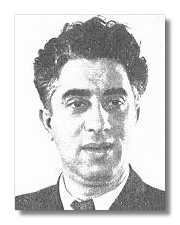Time for a little kulchur: some words on Khatchaturian

For the first time in months, I listened to some music by the once famous composer Aram Khatchaturian. I find it odd that his name is not as recognizable these days since, not only was he one of the 20th century's most famous composers, he is (if memory serves) the only composer ever to be on the American top 40, probably back in the 1940s due to the popularity of his "Sabre Dance", otherwise known as the circus song (not one of my favourite pieces, but it is recognizable). In the 1950s, he was a household name in America.
The CD I listened to was a burnt copy of a CD I once checked out from York University's Music Library. I forget the name of the CD, but there aren't that many. I listened to CD 1, which features his famous symphony in D preceded by a Piano Concerto (No. 2, I think. Incidentally, Dr. J, I burned this for you back in August).
I am not an expert in music, much less classical music, but Khatch. sure has his charms. I wouldn't be surprised if a musicologist out there has written on his influence on subsequent music. As a "modernist," Khatch employed some odd rhythms and frequently made use of atonality ("wrong notes"). What I like though is a) he doesn't go overboard with the atonality, and b) unlike many composers, he doesn't use atonality for its own sake; it actually sounds good! An analogy could easily be made from literature: imagine two modernist or post-modernist writers: both make use of every conceivable modernist conceit, technique, etc, except the first seems laboured, boring and pretentious whereas the other one actually makes it work. One thinks of Virginia Woolf and possibly James Joyce, but I hated Wyndham Lewis, to say nothing of postmodernists. I'm sure there are good postmodernists out there, and as my exposure has been limited, I can't comment on all: I am especially less than fond of a certain Canadian, who shall remain nameless, who wrote a "book" that had something to do with Paul Bernardo. Rest assured it was the worst piece of garbage I had ever read, and it was one of the very few books in my life I stopped reading and actually sold.
I've digressed: I really like Khatch, and I think he is currently underrated or possibly just forgotten. Give him a listen if you can find something of his. Sure Khatch is Armenian, but that's not why I like him: if I didn't like him, I simply wouldn't listen to him.
Another thing that I really like about him is that, with very few exceptions, every notes counts: in other words, every note has "feeling" in it and is there for a reason. Khatch rarely lapses into the empty music that is so very common (even the very best composers indulge in it, and Mozart, at least in Amadeus, was accused of playing "too many notes").
Aram is something of a forgotten genius: even the most illiteratue, uncouth blockheads know that Mozart was a child prodigy, writing and composing major works before the age of 12. Khatchaturian is not very different: born into a peasant family outside of Tblisi, Georgia (the Republic, not the State), he had no musical training or anything of the like until he was in his twenties. By the time he was thirty, he was already composing major works. His contemporaries, such as Stravinsky, Rachmaninov and Samuel Barber, thought very highly of him (in fact, the American Samuel Barber considered him the best living composer).
UNESCO declared 2003, the centenary of his birth, as the year of Aram Khatchaturian. Unless I missed something, I was very disappointed that the Toronto Symphony Orchestra did not hold any concerts on this occasion, but I did see a documentary on him.
I'm not sure if there are any print bios out there (there must be), but thanks to the internet,
much can be learnt in minutes and from the convenience of ones home.
Now I must go and get me a coffee and continue reading Frye's Great Code (yep, that's right, picked it up 2 days ago). But that's another post.







